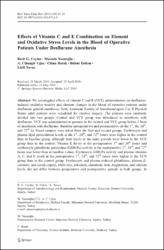Effects of vitamin C and e combination on element and oxidative stress levels in the blood of operative patients under desflurane anesthesia

Göster/
Erişim
info:eu-repo/semantics/openAccessTarih
2011Yazar
Ceylan, Berit GökçeNaziroğlu, Mustafa
Uğuz, A. Cihangir
Barak, Cihan
Erdem, Bülent
Yavuz, Lütfi
Üst veri
Tüm öğe kaydını gösterÖzet
We investigated effects of vitamin C and E (VCE) administration on desflurane-induced oxidative toxicity and element changes in the blood of operative patients under desflurane general anesthesia. Forty American Society of Anesthesiologists I or II Physical Status adult patients were scheduled for elective surgery. The patients were randomly divided into two groups. Control and VCE group was introduced to anesthesia with desflurane. VCE was administreted to patients in the control and VCE group before 1 hour of anesthesia with desflurane. Baseline (preoperative) and postoperative (at the 1(st), the 24(th), and 72(th) h), blood samples were taken from the first and second groups. Erythrocyte and plasma lipid peroxidation levels at the 1(st), 24(th), and 72(th) hours were higher in the control than in baseline group, although their levels at the same periods were lower in the VCE group than in the control. Vitamin E levels at the postoperative 1(st) and 24(th) hours and erythrocyte glutathione peroxidase (GSH-Px) activity at the postoperative 1(st), 24(th), and 72(th) hours was lower than in baseline values. Erythrocyte GSH-Px activity and plasma vitamins A, C, and E levels at the postoperative 1(st), 24(th), and 72(th) hours were higher in the VCE group than in the control group. Erythrocyte and plasma reduced glutathione, plasma beta-carotene, and serum copper, while zinc, selenium, aluminum, iron, magnesium, and calcium levels did not differ between preoperative and postoperative periods in both groups. In conclusion, VCE combination prevented the desflurane-induced vitamin E and GSH-Px consumptions to strengthen the antioxidant levels in the blood of operative patients.

















